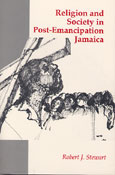Religion and Society in Post-Emancipation Jamaica

- Author(s): Stewart, Robert J.
- Series:
- Imprint: Univ Tennessee Press
- Publication Date: 1992-08-30
- Status: Active
What role did religion or the agents of religion, both European and Afro-Jamaican, play in the conflicts that characterized the formation of a creole society in Jamaica after emancipation? Beginning from this question, Robert J. Stewart has produced the most comprehensive available treatment of the religious, social, and cultural history of nineteenth-century Jamaica.
This remarkable volume explores the interaction of two Christianities, one European and the other African-based. It examines the organization, presence, politics, and mission philosophy of the major Christian denominations, as well as the creative responses of Afro-Jamaicans to evangelization. The ideological, theological, and racial assumptions embraced by the various denominations and missionaries prevented them from valuing Africanisms in the religious and cultural heritage of Afro-Jamaicans and, with Baptist exceptions, from identifying with the latter’s aspirations and social problems. In consequence, Afro-Jamaican religion became a source of identity and resistance against European cultural hegemony in Jamaica.
Drawing on rich troves of documents unavailable in the United States, Stewart develops major new accounts of the processes of syncretism and creolization. His grasp of European intellectual history and deft critiques of prior scholarship add to the importance of this work. An excellent raconteur, the author also presents a vivid portrait gallery of both missionaries and Afro-Jamaicans during this crucial period in the island’s history.
The Author: Robert J. Stewart teaches history and English at Trinity School, New York City. He worked as a Jesuit missionary in Jamaica and has a Ph.D. in history from the University of the West Indies.
